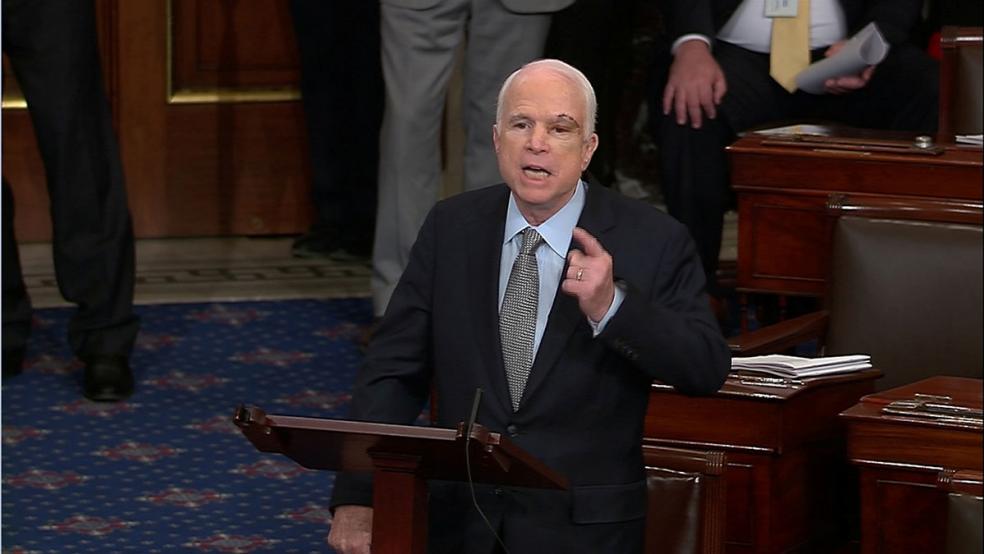Arizona Sen. John McCain, recently diagnosed with an aggressive form of brain cancer, arrived in the Senate chamber to a hero’s welcome on Tuesday in time to cast a key vote that helped the Republican party advance its effort to repeal the Affordable Care Act.
He then took the floor and delivered a speech repudiating the process that he had just seemingly endorsed with his vote, adding that he would not personally support the ACA-related legislative proposals before the Senate unless they are dramatically changed.
Related: New Republican Plan to Repeal Obamacare Gets an Ugly Score From CBO
He lamented the state of the Senate, comparing the current partisan atmosphere unfavorably with the days in which it could claim to be “the world’s greatest deliberative body” as he put it, “with a straight face.”
Further, he called for a renewal of bipartisanship in the legislative process. “Let’s trust each other,” he said. “Let’s return to regular order. We’ve been spinning our wheels on too many important issues because we keep trying to find a way to win without help from across the aisle.” Both sides are guilty of “mandating legislation from the top down” and “getting nothing done” for the American people.
McCain’s vote helped the GOP-led Senate squeeze out a narrow 51 to 50 victory on a procedural vote that will allow members to consider various legislative proposals to repeal and/or replace the ACA. Because two of the 52 Republicans in the chamber voted against the measure, Vice President Mike Pence was on hand and cast the tie-breaking vote.
The options are varied. One version is essentially a repeal-only bill that would create a two-year window for lawmakers to craft a replacement in advance of the elimination of the ACA. Others represent various combinations of tweaks and limited repeals that would, in general, cut taxes on the wealthy, reduce the value of healthcare subsidies given to low- and middle-income Americans, and slash spending on Medicaid, the program that serves the poorest Americans. All of them, according to the Congressional Budget Office, would result in tens of millions of Americans losing health insurance within a decade.
Related: Can Trump Raise the Dead? Senate to Vote One More Time to Repeal Obamacare
Despite their victory in bringing the bill to the floor for debate, it remains unclear whether Republicans will have the votes to pass something and, even if they do, whether they will be able to reach an agreement with the House of Representatives on a conference report given that the lower chamber tends to be much more conservative than the upper.
On Tuesday, Senate leaders were floating yet another potential proposal, a fallback “skinny repeal” bill that would eliminate the employee and employer mandates.
McCain’s appearance on Tuesday provoked a wide range of reactions beyond the Senate chamber. On the one hand, his call for a return to “regular order” was blasted as hypocritical, given the vote he had just cast. In the Senate, regular order refers to the system in which bills move through the committee process, with public hearings, testimony from expert witnesses, and multiple opportunities for senators to offer amendments.
The Republican effort to repeal and replace the ACA, however, has completely bypassed the regular order process. There were no public hearings and no markups in which amendments were offered. It may even be the case if the so-called “skinny repeal” measure comes up for a vote, that senators will be asked to decide on a bill whose legislative language they have not even seen.
Related: Two Republican Senators Just Guaranteed Runaway Spending on Medicaid
Many commentators attacked McCain’s paean to regular order for being in direct conflict with his vote to advance a bill that completely avoided it.
But even as McCain did the bidding of McConnell and President Trump in keeping the Republican effort to dismantle Obamacare alive by voting to proceed to the debate, he strongly signaled in his floor speech that he would oppose any of the alternative schemes that will be considered this week.
“I voted for the motion to proceed to allow debate to continue and amendments to be offered,” he explained. “I will not vote for the bill as it is today.”
By doing so, the ailing Arizona senator -- who was loudly cheered and applauded as he returned to the Senate chamber -- simultaneously commanded center stage in the unfolding health care debate while also offering some political cover and comfort to the small handful of moderate Republicans who are leaning against any of the GOP plans.
It’s far from clear how those Republicans will vote on the raft of proposals that will be brought up in the coming day or two, but they are almost certain to have a highly-regarded McCain in their corner.
McCain is from one of more than 30 states that accepted expanded Medicaid coverage under the ACA, and Arizona’s GOP governor, Doug Ducey, wants to preserve that coverage. “I have to tell you that I try to respect and respond to the elected leaders in my home state,” McCain said recently.






